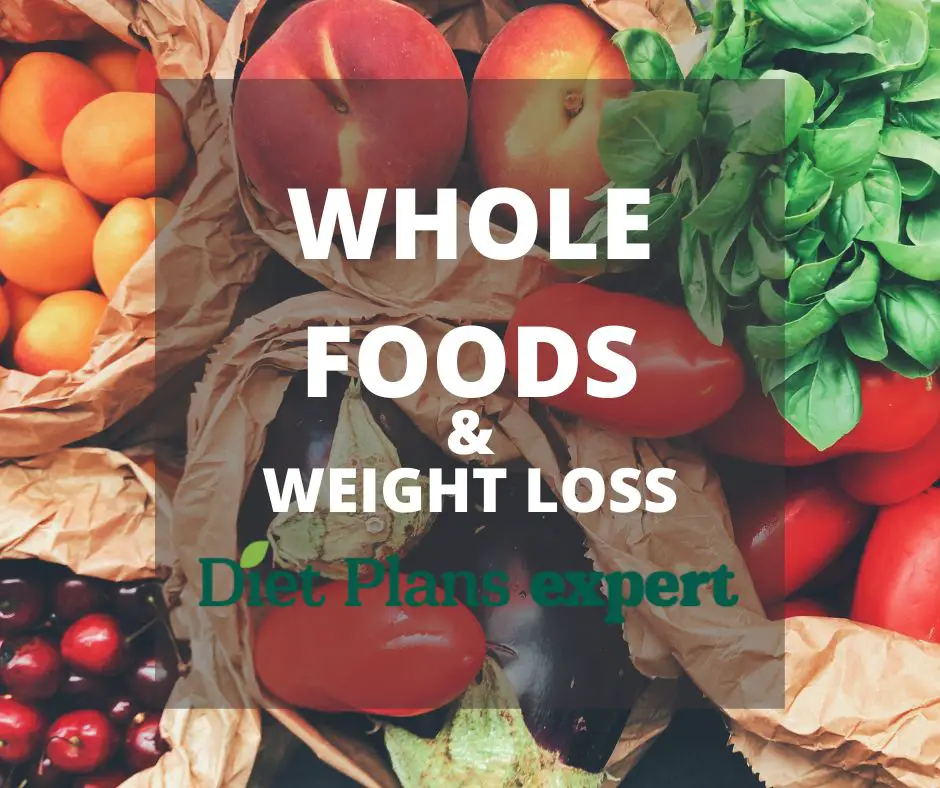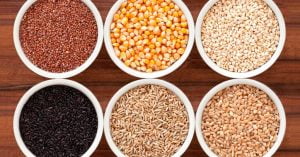
Are you tired of fad diets and temporary weight loss solutions? If so, it’s time to turn to nature’s own secret weapon: whole foods.
Whole foods are unprocessed or minimally processed foods that have been minimally refined or altered from their natural state. They are rich in nutrients, fiber, and antioxidants, and they have been shown to promote weight loss and overall health.
In this article, we will explore the numerous benefits of incorporating whole foods into your weight loss journey and how they can transform your overall well-being.
Whole foods are unprocessed or minimally processed foods that have been minimally refined or altered from their natural state. They are typically made from whole grains, fruits, vegetables, nuts, seeds, and legumes.

whole foods
Whole foods are as close to their natural state as possible. They are not refined, bleached, or processed in any way. This means that they retain all of their nutrients and fiber, which is important for weight loss and overall health.
Some examples of whole foods include:
These are just a few examples of the many whole foods that are available. When you eat whole foods, you are getting the most nutrients for your calorie intake.
A table that shows examples of whole foods with calories:
| Food | Serving Size | Calories |
|---|---|---|
| Apple | 1 medium | 95 calories |
| Banana | 1 medium | 105 calories |
| Orange | 1 medium | 62 calories |
| Grapes | 1 cup | 100 calories |
| Strawberries | 1 cup | 50 calories |
| Watermelon | 1 cup | 46 calories |
| Broccoli | 1 cup, cooked | 31 calories |
| Carrots | 1 cup, cooked | 50 calories |
| Sweet Potato | 1 cup, cooked | 160 calories |
| Yam | 1 cup, cooked | 103 calories |
| Lentils | 1 cup, cooked | 230 calories |
| Beans | 1 cup, cooked | 255 calories |
| Nuts | 1 ounce | 160 calories |
| Seeds | 1 ounce | 140 calories |
| Yogurt | 1 cup, plain nonfat | 120 calories |
| Eggs | 2 large | 180 calories |
| Salmon | 3 ounces, cooked | 175 calories |
| Chicken breast | 3 ounces, cooked | 140 calories |
It is also important to note that the calories in whole foods are not the only thing that matters. Whole foods are also rich in nutrients, such as vitamins, minerals, fiber, and antioxidants. These nutrients are essential for good health and can help you maintain a healthy weight.
If you are trying to lose weight, it is important to create a calorie deficit. This means that you need to eat fewer calories than you burn. Whole foods can help you create a calorie deficit because they are filling and satisfying. This means that you are less likely to overeat and you will feel fuller for longer.
If you are looking to improve your overall health, it is important to include whole foods in your diet. Whole foods are a great source of nutrients and they can help you maintain a healthy weight.
Nutrient density is a measure of the amount of nutrients in a food relative to its calories. Nutrient-dense foods are those that are high in nutrients and low in calories. They are an important part of a healthy diet for weight loss because they can help you feel full and satisfied while still consuming fewer calories.
Whole foods are naturally nutrient-dense. They are packed with essential vitamins, minerals, and antioxidants that are important for good health. For example, fruits and vegetables are a good source of vitamins A, C, and K, as well as fiber. Whole grains are a good source of B vitamins, iron, and magnesium. Lean proteins are a good source of protein, iron, and zinc.
Nutrient-dense foods are important for satiety, which is the feeling of fullness that you experience after eating. When you eat nutrient-dense foods, you are more likely to feel full and satisfied, which can help you eat less and lose weight.
In addition, nutrient-dense foods are important for overall health. They provide your body with the nutrients it needs to function properly. Eating a diet rich in nutrient-dense foods can help you reduce your risk of chronic diseases such as heart disease, stroke, type 2 diabetes, and cancer.

whole foods
source: Pexels
Here are some examples of nutrient-dense foods:
These are just a few examples of the many nutrient-dense foods that are available. When you choose nutrient-dense foods, you are making a healthy choice for your weight loss and overall health.
Whole foods are a good source of fiber, which is a nutrient that can help you lose weight. Fiber is not digested by the body, so it passes through the digestive tract and helps you feel full. This can help you eat less and lose weight.
Fiber takes up space in the stomach, which can help you feel full after eating. This can help you eat less and lose weight. Additionally, fiber slows down the digestion of food, which helps to keep you feeling full for longer.
Fiber also helps to regulate blood sugar levels. When you eat fiber, it slows down the absorption of sugar into the bloodstream. This can help to prevent spikes and crashes in blood sugar levels, which can lead to cravings and overeating.
Here are some examples of high-fiber foods:

whole foods
These are just a few examples of the many high-fiber foods that are available. When you choose high-fiber foods, you are making a healthy choice for your weight loss and overall health.
In addition to helping you lose weight, fiber can also help with the following:
So, if you are looking for a way to lose weight and improve your overall health, adding more fiber to your diet is a great place to start
Added sugars are sugars that are added to foods during processing or preparation. They are not naturally occurring in the food. Added sugars can be found in a wide variety of foods, including soda, candy, pastries, and even savory foods like bread and salad dressing.
Whole foods, on the other hand, contain naturally occurring sugars. These sugars are not added to the food during processing. They are found in the fruit, vegetables, and grains that make up the food. Naturally occurring sugars are not harmful to your health. In fact, they can be a healthy part of your diet.
Eating too much added sugar can contribute to weight gain. This is because added sugars are high in calories and low in nutrients. They can also lead to insulin resistance, which can increase your risk of developing type 2 diabetes.
Reducing your intake of added sugar can help you lose weight and improve your overall health. When you reduce your intake of added sugar, you are also reducing your intake of empty calories. Empty calories are calories that do not provide any nutritional value. They can contribute to weight gain and other health problems.
Here are some tips for reducing your intake of added sugar:
By following these tips, you can reduce your intake of added sugar and improve your weight loss and overall health.
In addition to helping you lose weight, reducing your sugar intake can also help with the following:
So, if you are looking for a way to lose weight and improve your overall health, reducing your sugar intake is a great place to start.
Whole foods are more satiating than processed foods. This means that they help you feel full for longer after eating. There are a few reasons for this. First, whole foods are typically higher in fiber, which helps to slow down digestion and keep you feeling full. Second, whole foods are typically lower in calories than processed foods, so you can eat more of them without consuming too many calories. Third, whole foods contain more nutrients, which can help to keep your blood sugar levels stable and prevent cravings.
Whole foods provide sustained energy because they are digested slowly. This means that your blood sugar levels do not spike and crash, which can lead to cravings. Additionally, whole foods contain nutrients that help to keep you feeling full. This can help you to avoid snacking on unhealthy foods throughout the day.
Satiety is important for weight loss because it helps you to eat fewer calories. When you are feeling full, you are less likely to overeat. This is important because if you are eating more calories than you are burning, you will gain weight.
Here are some tips for increasing satiety:
By following these tips, you can increase your satiety and help you lose weight.
In addition to helping you lose weight, increasing your satiety can also help with the following:
So, if you are looking for a way to lose weight and improve your overall health, increasing your satiety is a great place to start.
Incorporating whole foods into your diet can help you lose weight in a sustainable way. This is because whole foods are nutrient-dense and satisfying, which can help you eat fewer calories and feel full. Additionally, whole foods are typically lower in calories than processed foods, so you can eat more of them without consuming too many calories.
Adopting a whole foods-based diet can have many long-term health benefits. These benefits include:
Here are some practical tips for incorporating more whole foods into your everyday meals:
By following these tips, you can incorporate more whole foods into your everyday meals and improve your health in the long term.
In conclusion, eating whole foods can be a great way to lose weight and improve your overall health. Whole foods are nutrient-dense and satisfying, which can help you eat fewer calories and feel full. Additionally, whole foods are typically lower in calories than processed foods, so you can eat more of them without consuming too many calories.
If you are looking for a sustainable weight loss strategy, I encourage you to embrace whole foods. They are a great way to get the nutrients you need and feel your best.
Here are some tips to help you get started:
With a little effort, you can incorporate more whole foods into your diet and start your journey towards a healthier, more vibrant self.
Important:
Are you ready to start your journey to a healthier self? If so, I encourage you to take the following steps:
Read this post for more information about healthy eating tips:
Here are some additional resources that you may find helpful:
